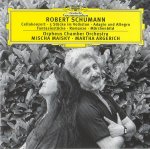There’s much to be said for performing Schumann’s cello concerto with a chamber orchestra rather than the full symphonic complement of massed strings. First, it benefits the soloist in a work that’s unhelpfully littered with registral problems (much of the solo writing involves complex passagework and string crossing in the most perilous regions of the instrument), and he no longer has to struggle against Schumann’s often problematic orchestral textures. Second, the listener also benefits considerably, and in this recording by Mischa Maisky and the Orpheus Chamber Orchestra, the ear registers countless details among the inner supporting voices that pass undetected in most recordings. A particular fascination here is the clearly audible role of second violins and violas, in a performance that emulates large-scale chamber music.
Maisky wasn’t the first to opt for chamber-sized accompaniment, but in no sense is his account as satisfying as the very fine 1989 Harmonia Mundi version by Luis Claret with the English Chamber Orchestra under Edmon Colomer. Maisky’s technique and agility are phenomenal; the work holds no terrors for him. But as usual with this artist, the full-on intensity, frenetic vibrato, and near-manic emotional out-wringing of every passage (even those with no particular rhetorical importance like the first movement’s second subject theme) turn the performance into a tournament. It’s definitely not what Schumann envisioned; Maisky’s approach lacks warmth and subtlety, and worse still, it tries to make the piece into something it was never designed to be, a vehicle for bravura display alone. That’s why a more measured, thoughtfully resigned approach, one that leaves the subjective analysis to the listener’s sensitivity and imagination, usually will prove more satisfying. As Claret demonstrates eloquently, his technique and sense of style leave nothing to be desired, and his understated but noble reading is vastly more rewarding than Maisky’s hectoring newcomer.
The shorter pieces with piano (with Martha Argerich) bring some pleasing moments, chiefly in the Op. 73 Fantasiestücke and Op. 105 Stücke im Volkston, but Maisky’s performance of the Adagio and Allegro Op. 70 brings the same failings as the concerto. If you’re looking for a more conventionally scaled recording of the cello concerto, go for Janos Starker. His famous Mercury account with the London Symphony under Skrowaczewski affords crystalline tone colors and no less urgent tempos than his earlier 1957 EMI version with Giulini and the Philharmonia Orchestra. Equally, his 1994 remake with Dennis Russell Davies and the Bamberg Symphony (for RCA) is perhaps the more mature, considered, and introspective version, but all are outstanding, and in a different league from Maisky’s.
































